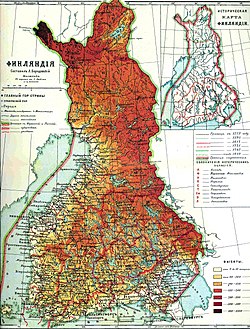Kingdom of Finland (1918)
| Kingdom of Finland | ||||||||||
|
Suomen kuningaskunta (Finnish) Konungariket Finland (Swedish) |
||||||||||
|
||||||||||
|
||||||||||
|
Anthem Maamme / Vårt land "Our Land" |
||||||||||
|
Map of the Grand Duchy of Finland, which had the same borders as independent Finland from 1917 until 1920.
|
||||||||||
| Capital | Helsinki | |||||||||
| Languages | Finnish · Swedish | |||||||||
| Religion |
Evangelical Lutheranism Finnish Orthodoxy |
|||||||||
| Government | Regency | |||||||||
| Monarch | ||||||||||
| • | 1918–1919 | Vacant a | ||||||||
| Regent | ||||||||||
| • | 1918 | Pehr Evind Svinhufvud | ||||||||
| • | 1918–1919 | Carl Gustaf Mannerheim | ||||||||
| Prime Minister | ||||||||||
| • | 1918 | Juho Kusti Paasikivi | ||||||||
| • | 1918–1919 | Lauri Ingman | ||||||||
| • | 1919 | Kaarlo Castrén | ||||||||
| Legislature | Parliament | |||||||||
| Historical era | World War I / Interwar period | |||||||||
| • | Independence declared (as a republic) | 6 December 1917 | ||||||||
| • | Supreme authority given to regent | 18 May 1918 | ||||||||
| • | King elected | 9 October 1918 | ||||||||
| • | Parliamentary election | 3 March 1919 | ||||||||
| • | Republican constitution adopted | 17 July 1919 | ||||||||
| Currency | Finnish markka | |||||||||
|
||||||||||
| Today part of |
|
|||||||||
| a. Frederick Charles was elected King of Finland on 9 October 1918 and renounced the throne on 14 December 1918. | ||||||||||
The Kingdom of Finland (Finnish: Suomen kuningaskunta; Swedish: Konungariket Finland) was an abortive attempt to establish a monarchy in Finland following Finland's independence from Russia. Had the German Empire endured, Prince Frederick Charles of Hesse could have been installed as the King of Finland.
Finland had declared independence from what was the Russian Empire, at that time embroiled in the Russian Civil War, on 6 December 1917. At the time of the declaration of independence, monarchists were a minority in the Finnish Parliament, and Finland was declared a republic. A civil war followed, and afterwards, while the pro-republic Social Democratic Party was excluded from the Parliament and before a new constitution was adopted, Frederick was elected to the throne of Finland on 9 October 1918.
Lithuania had already taken a similar step in July 1918, electing Wilhelm Karl, Duke of Urach, Count of Württemberg as King Mindaugas II of Lithuania. In Latvia and Estonia, a "General Provincial Assembly" consisting of Baltic-German aristocrats had called upon the German Emperor, Wilhelm II, to recognize the Baltic provinces as a joint monarchy and a German protectorate. Adolf Friedrich, Duke of Mecklenburg-Schwerin was nominated Duke of "the United Baltic Duchy" by the Germans.
...
Wikipedia



